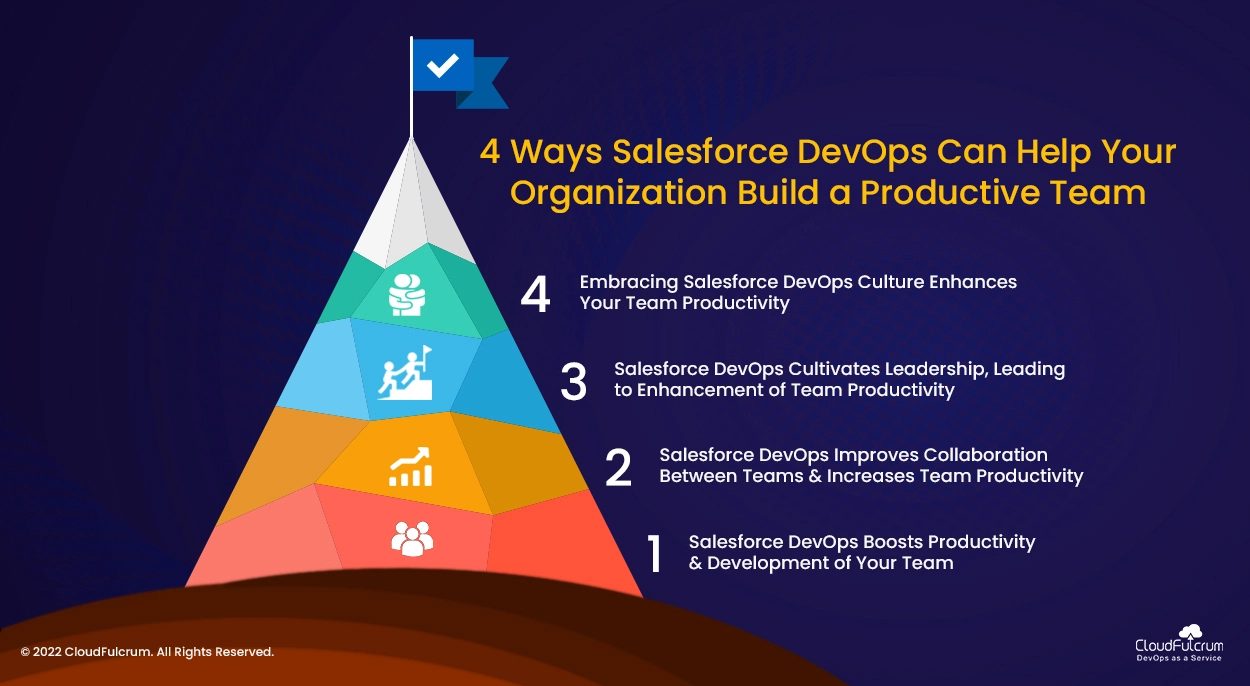Introduction
Collaboration is the crux of Salesforce DevOps. For Salesforce DevOps to be successful, teams need to understand what’s being built, its architecture, and how the team and its developers will interact with it. Open and transparent communication is at the core of Salesforce DevOps.
When there is collaboration between operations and development teams, they don’t just boost efficiency, but gain a competitive advantage. Organizations that implement Salesforce DevOps experience swifter deployment cycles, faster recovery from failures, and better customer service. But, Salesforce DevOps affects more than organizational processes.
The disconnect between Development, QA and Operations teams has always been a major impediment for organizational management, and overcoming this impediment is crucial for any successful IT organization. This is where Salesforce DevOps comes into picture. Salesforce DevOps is a set of practices designed to accelerate software product release, reduce wastage of time and resources, and improve customer experience. But more significantly, superior quality Salesforce DevOps is primarily focused on people, their attitude and the culture of their interactions. Gartner’s research suggests that 90% of organizations that utilize DevOps without targeting their cultural background will possibly end up in failure.1 With this in mind, when thinking of applying Salesforce DevOps, IT organizations should focus on DevOps culture as one of the most significant conditions for successful team performance.
As opposed to a tool or methodology, Salesforce DevOps is more of a culture that organizations can embrace and adopt between development and operations within a team. It includes a high degree of collaboration across roles focusing on the business than on departmental goals.
4 Ways Salesforce DevOps Can Help Your Organization Build a Productive Team
#1: Salesforce DevOps Boosts Productivity & Development of Your Team
The business value of Salesforce DevOps is extremely profound. The Salesforce DevOps strategy boosts application quality and minimizes delivery times of business software. Salesforce DevOps also improves the productivity and development of business teams. The trend of Salesforce DevOps has compelled a host of business organizations to automate their deployment and software release processes.
Salesforce DevOps benefits your organization by strengthening office communication and collaboration. Constant communication boosts productivity. The more the workers communicate while working together, the better the quality of services delivery they ensure. Salesforce DevOps is a tool for improving the camaraderie of employees while boosting their morale. This is also one of the reasons why Salesforce DevOps is one of the best tools for team management strategies.
Automation rapidly accelerates business growth by minimizing slow and manual business processes. Salesforce DevOps allows business organizations to evolve swiftly and consistently. Implementing Salesforce DevOps can help you save 60% time you spend on managing support cases.2 On the other hand, time spent on infrastructure improvements rises by 33%.3 All of these benefits of Salesforce DevOps combine to boost productivity. Our team can help you automate repetitive routine tasks to free your unproductive time and minimize costs. Business growth and competitive advantage come in as added bonuses with the process.
#2: Salesforce DevOps Improves Collaboration Between Teams & Increases Team Productivity
As the name itself sounds, Salesforce DevOps brings together two critical parts of your business operations. The method brings Operations and Development under a single umbrella. A single umbrella could be one team having common or shared goals. The integration of business developments and business goals implies that your team takes care of each stage of the Salesforce DevOps application lifecycle, comprising development, testing, and operations.
The disconnect between Development and Operations created a host of inefficiencies that made organizations pay heavily. Time is money, and traditional Operations seemed to waste a lot of time. Until the emergence of Salesforce DevOps, a traditional DevOps team would:
- Spend about 7.2 hours per week on communication
- Need 21% more time to tackle incidents
- Waste 41% more time overall
Fast forward to the future, and now we don’t have any impediments to enhance productivity. Salesforce DevOps boosts collaboration and cooperation by 55% and helps everyone stay at the same level.4 Organizations can not only recover swiftly from incidents but also have fewer failures. You also have the freedom to push the Salesforce DevOps method to its limits. Your team will be collaborating closely to discover new practices as they take advantage of business automation promoted by Salesforce DevOps.
#3: Salesforce DevOps Cultivates Leadership, Leading to Enhancement of Team Productivity
Irrespective of whether you wish to create exclusive Salesforce DevOps teams, the process itself requires continuous leadership — people who can track the initiatives and keep them going smoothly, and ensure the team diligently applies the best practices and methodologies. If not an exclusive team, representatives from each department can be assigned into the leadership effort. Therefore, Salesforce DevOps indirectly spurs leadership, which, in turn, leads to greater team productivity because of such inspired leadership.
#4: Embracing Salesforce DevOps Culture Enhances Your Team Productivity
In Salesforce DevOps, it is essential to imbibe the cultural change, which is possible by integrating teams by creating a collaborative environment. It is very vital to create an environment where Development, QA, and Operations teams can communicate regularly and share their experience and ideas simultaneously to solve problems. Gather the support of team members who understand and encourage the idea of Salesforce DevOps implementation. The leaders who support the idea of IT teams working together will positively influence other team members. Support and develop professionals with multi-skills, which will enhance the understanding of processes and work culture within other teams.
Traditionally, Development, QA, and Operations teams have had separate roles and worked in isolated silos. With Salesforce DevOps, they now work as a single team. Salesforce DevOps encourages continuous collaborative learning. It motivates software teams to expand and enhance their skills incessantly. Organizations must create a conducive environment for teams to grow professionally and evaluate their own progress. The performance reports should be transparent for all the teams. Such a cultural change brings about a strong bonding within the different teams, thereby increasing their overall productivity.
Conclusion
You will need to implement several tools to build your Salesforce DevOps process. These include automated testing, in addition to integrated configuration and change management. Another critical aspect is the willingness of developers to provide production support for key issues and to oversee application performance. Both these practices will enhance their software coding abilities. The ultimate benefit of Salesforce DevOps is a continuous integration and deployment process, which, in turn, helps you to quickly respond to the needs of internal users and your customers.
About CloudFulcrum
With its mission of “DevOps as a Service,” CloudFulcrum has been a part of multiple successful Salesforce implementations worldwide, with delighted customers in BFSI, Healthcare, Retail, Real Estate, and Technology verticals.
With our DevOps Consulting, we help organizations align their Digital Transformation goals to achieve higher efficiency, faster time-to-market, and better quality of software builds with early identification of arising issues, enabling the continuous release of Salesforce applications.
1 Vladimir Fedak, How DevOps Culture Improves Team Performance, https://itsvit.com/blog/how-devops-culture-improves-team-performance/, January 15, 2021.
2 Dmitry Leiko, How DevOps Helps Your Company to Grow, https://devrix.com/tutorial/how-devops-helps-company-grow/, July 30, 2020.
3 Ibid
4 Op. Cit. Dmitry Leiko.

